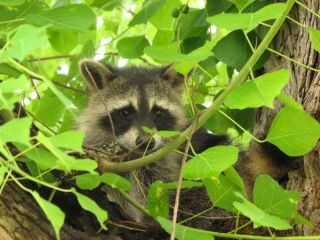.
Trapper John,
Expert Raccoon Trapper

Raccoons are intelligent woodland creatures that can weigh up to 20 pounds, have a dark "mask" of fur on their face, and have made themselves at home in towns and suburbs as well as rural areas. Another notable feature is their long bushy tail with alternating bands of dark and light fur which can reach sixteen inches in length.They have short legs, can climb headfirst down trees, and are very good swimmers.
.
Raccoons are rather short-sighted but have a heightened sense of touch and are mostly nocturnal feeders who feast on bugs, worms, fruits and other plant parts, as well as birds and rodents. They will raid gardens as well as garbage cans. They can and will look for food during the day and have been known to fish. Raccoons will also happily share your pets food. Raccoons are also very inquisitive and will peer through windows or even enter rooms out of curiosity.

.
Raccoons share territory with each other, and bear their young usually in the spring. Usually two to five young raccoons, called "kits" will stay with the mother until late fall/early winter. Raccoons will usually nest up in trees off of the ground but will also make dens in walls and attics or even crawl spaces under a house or porch. Males are usually noticeably heavier than females, and their body weight can vary greatly depending on the season. In the wild raccoons usually survive for only a short two or three years but have been known to live more than twenty years in captivity.
Raccoons are carriers for several diseases, including rabies, and distemper which can wipe out whole raccoon populations in an area. They can also spread roundworms to anyone handling them.
